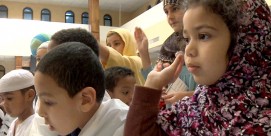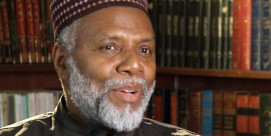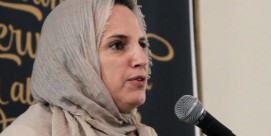John W. Kiser: Christian-Muslim Love
The recent opening across the United States of the much praised French film “Of Gods and Men” is an important event. As a fraternal love story wrapped in a horror story, it offers much reason for hope, as well as room for despair, depending on the lens of the viewer.
My lens is one of hope, based on six years of research and writing “The Monks of Tibhirine,” the book French director Xavier Beauvois called his “bible” for making his movie about Christian-Muslim friendship. My hope is also based on knowing the back story that goes untold in an otherwise excellent film focusing on the monks’ struggle to be true to their Trappist vows of poverty, charity, and stability when faced with their fear of a brutal death.

Some people today might say that Christian-Muslim love is an oxymoron. Yes, there are Muslims who preach hatred of the Christian West, even though fewer and fewer in the West (outside the US) are practicing or even professing Christians. There are no Muslims I have heard of who preach hatred or even disrespect for Jesus Christ, who is a much revered and sinless prophet in Islam.
There is, however, an active Christian minority that preaches hatred of Islam and regularly insults the Prophet Muhammad. Elements with political agendas on both sides benefit from blackening the other, and the media have been willing accomplices to this downward phobic spiral. “Of Gods and Men” is film that could help right perceptions.
Despite pleas in 1996 from both French and Algerian authorities to leave for a safer place when threatened by Islamic extremists, the monks remained at their remote monastery in Algeria’s Atlas Mountains out of deep sense of commitment to their extended family of villagers who depended on them for moral, medical, and material support. Like their neighbors, the monks trembled with fear at night. They argued among themselves: does the Good Shepherd abandon his flock when the wolves come? Does a mother abandon a sick, infectious child? Does their vow of poverty allow for them to flee to safer ground when their friends cannot?
When seven of the monks were kidnapped, it was not their neighbors who did it. Instead, it was a contract job that employed a group from outside the area to take the monks away from their dangerous situation—to be traded, in effect. But something went wrong along the way. Of one thing I am certain: killing them was not the plan. If that had been the case, they would not have been schlepped around the country for two months nor would negotiations for their release have taken place. Yet for some viewers, I suspect this will be seen as simply another “bad-Muslims-kill–good-Christians” story—exactly what the abbot of the monastery feared when he wrote his last testament, read at the end of the film.
The film works very well dramatically as a struggle between faith and fear. By necessity it leaves out important and broader story components. The tenacious commitment of Abbot Christian de Chergé (played by Lambert Wilson) to serve God in Algeria had been formed in him as a soldier serving in the French army during the Algerian war for independence from 1954 to 1962, when his life was saved by a Muslim friend, an Algerian policeman named Mohammed who faced down local rebels who wanted to shoot Christian one day when they were taking a walk—a time when they would discuss their faith.
That friendship cost the Algerian his life the next day. For Christian, Mohammed’s sacrifice was a gift of love reinforcing his belief that the spirit of Jesus Christ resides in all his children. For the rebels, the friend of my enemy is my enemy.
The film doesn’t have room to tell about the seventy-plus imams who, based on the same logic, were assassinated in the 1990s for denouncing what the terrorists were doing in the name of Islam. The terrorists themselves could show respect for the monks. In a dramatic scene in the film, Saya Attia, head of the terrorist group that intruded upon the monastery on Christmas Eve 1993 with demands for medical help, apologizes to Christian for disturbing their celebration of the birth of Jesus Christ. Left out are the leader’s final words to Christian when he extends a hand in friendship: “We don’t consider you foreigners…you are religious.”
Nor does the viewer know that the tiny hamlet of Tibhirine was inhabited by families whose homes in the mountains had been bombed by the French during the war for independence. They had fled to the protection of the monastery, a holy place where the Christian “marabouts” (Arabic for religious teachers) sheltered them until they could build their own homes.
I have one regret about the film. It might have ended on a more positive note for Christian-Muslim relations by showing the genuine remorse of much of the Algerian population. Archbishop Henri Teissier of Algiers received sacks of letters from ordinary Algerians after the monks’ deaths were confirmed. The letters expressed a deep sense of solidarity with the monks as well as a sense of shame that was captured by this one: “No matter what has happened, we truly love you. You are part of us. We have failed in our duty—to protect you, to love you. Forgive us…You must accomplish your divine mission with us. I believe it is God’s plan.”
Universal fraternal love is the essence of Christianity and all true religion. Otherwise, religion degenerates into celestial nationalism. Christian himself frequently said that if religion doesn’t help us to live together, it is worthless.
The idea may seem laughably naïve in a post-9/11 world. Love, however, has nothing to do with sentiment and everything to do with good will, justice, empathy, and respect for others. Like their Savior, the monks’ lives were not taken. They were gifts of love.
John W. Kiser is the author of “The Monks of Tibhirine: Faith, Love, and Terror in Algeria” (St. Martins Press, 2002).







